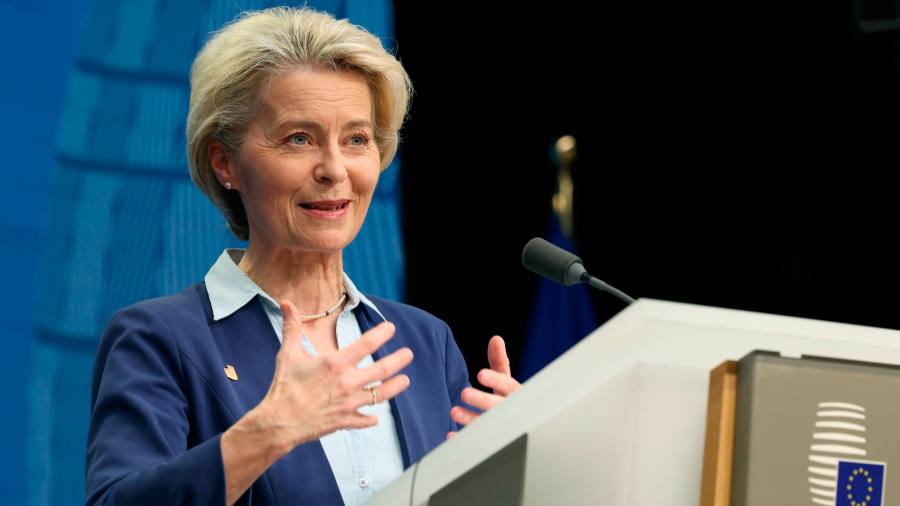
Receive free War in Ukraine updates
We’ll send you a myFT Daily Digest email rounding up the latest War in Ukraine news every morning.
Ursula von der Leyen has rebuffed European Central Bank fears that raiding the proceeds of frozen Russian assets would damage the euro or financial markets, pointing out that there had been no adverse reaction after western allies first swooped on the holdings last year.
The European Commission president said she would continue to work on a windfall levy on profits generated by the more-than €200bn in Russian state assets stuck in the EU — a plan that alarmed the ECB.
Von der Leyen said on Friday that the EU and its G7 allies had already taken the most “important step” over a year ago when they first immobilised hundreds of billions of euros of Russian central bank assets after Moscow’s full-scale invasion of Ukraine.
“This is now a long time ago and the reactions have been very calm,” von der Leyen said. “This is an indication that it is very well understood — the prudent approach we are choosing.”
Under the EU plan, securities depositories such as Euroclear, where the Russian assets are lodged, would be required to make a windfall contribution from the profits generated when they reinvest the proceeds of immobilised assets. The proposal, expected before the summer break, would fall short of seizing the underlying assets themselves, while allowing the EU to harvest billions for Ukraine’s reconstruction.
EU leaders discussed the idea at a summit in Brussels on Thursday but did not reach a consensus, as they await the fully outlined proposal and question the practicalities.
“We have to take a really close look at all the many legal and practical challenges to see what is actually doable, and we’re not at that point yet,” said Olaf Scholz, German chancellor.
“Everyone who is thinking about this at the moment admits that no one has a method that has been thoroughly tested and that works,” Scholz added.
Christine Lagarde, the ECB president, is concerned that any move by Brussels to take money that Russia claims as its own could tarnish the international appeal of the euro. The worry is that countries could turn their back on the single currency, fearing they risk the same fate as Russia should they one day be targeted by sanctions.
Those who are against the idea worry that a move to skim off money generated by the assets would be seen as a further step towards grabbing the underlying assets themselves — even though that is not the EU’s declared aim. Von der Leyen stressed that she was taking the EBC’s views into account as she designed the windfall levy policy.
Charles Michel, European Council president, said there was a “political will” to do something, but that it would be necessary to co-ordinate with the EU’s like-minded partners. Conclusions agreed by the bloc’s 27 leaders simply called on EU institutions “to take work forward, in accordance with EU and international law, and in co-ordination with partners.”
The majority of the Russian central bank assets immobilised in Europe are held in Belgium’s Euroclear, the world’s biggest settlement house. A windfall levy would raise around €3bn annually, officials say.
The decision to use a windfall tax was “a political direction that takes into account the necessity to maintain financial stability”, said Alexander De Croo, the Belgian prime minister. “The commission will do it and Belgium is involved because it’s an area we know well and about which we have a lot of regulatory knowledge.”
Leaders including Estonia’s Kaja Kallas and Slovakia’s Ľudovít Ódor supported pushing ahead with the idea around the summit table on Thursday, according to people briefed on the discussions.
But other leaders suggested there was more work to be done to assess the legal implications before deciding whether to proceed.
“Member states think that Russia has to pay, but there’s still a degree of caution on the reputational, and potentially financial, consequences for the EU,” said a senior European official briefed on the leaders’ discussions.
Additional reporting from Guy Chazan in Berlin